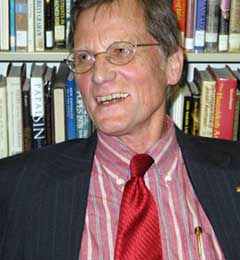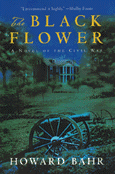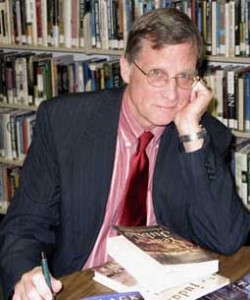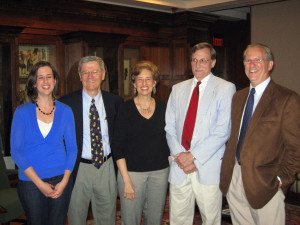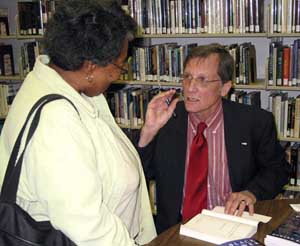Major Works
- Pelican Road (May 2008)
- The Judas Field: A Novel of the Civil War (2006)
- The Year of the Jubilo: A Novel of the Civil War (2000)
- The Black Flower: A Novel of the Civil War (1998)
- Home for Christmas (1987, 1997)
Biography of Howard Bahr
by Becky Utz (SHS)
Howard Bahr, originally Howard Hereford, was born in Meridian, Mississippi, in 1946. His present last name, Bahr, came from his stepfather, now deceased. As a child, Bahr realized his natural proclivity for writing and his love of reading. Listening to the tales of his grandfather, he realized an interest in the Civil War and the old South. His favorite authors include William Faulkner, Mark Twain, F. Scott Fitzgerald, and Edna St. Vincent Millay. When he was ten years old, Bahr and his family moved to Texas and subsequently moved to many other places across the United States throughout his childhood.
After his high school graduation in 1964, Bahr entered the United States Navy, where he served four years. After being released from the Navy in 1968, Bahr worked on the Gulf Coast Railroad for five years. In 1973, Howard Bahr entered the University of Mississippi in Oxford as a twenty-seven year old freshman. There he received both a Bachelor’s and a Master’s degree in English. He completed the coursework and examinations for a doctoral degree, but withdrew before completing a dissertation. During his time at Oxford, he worked as a curator at Rowan Oak, the William Faulkner Homestead and Museum, from 1976 to 1993. Also, he became an instructor of literature at the college and a re-enactor of the Civil War.
In August of 1993, Bahr set out for a change. Because his job at Rowan Oak and Ole Miss seemed to be a dead end, he accepted a job at Motlow State Community College in Tullahoma, Tennessee, teaching English as an assistant professor. It was after he moved to Tennessee that he published his first novel, The Black Flower, in 1998. It is a beautifully written novel about an ordinary soldier in the Civil War, which was nominated for The Stephen Crane Award, and won The Lincoln Prize from Gettysburg College and The LSU Michael Shaara Award for Civi War First Fiction. It was also nominated for the the Sue Kaufman First Fiction Award from the American Academy of Arts and Letters. In addition, the novel was chosen as both a Book-of-the-Month Club and a Quality Paperback Book alternate.
Bahr’s second book, The Year of the Jubilo, published in 2000, is also a novel about the Civil War. Many critics have commented on its depiction of sorrow, anarchy, and defeat, but others find in it a note of hope. Robert Morgan comments that the “affection for the greening countryside and town of Cumberland, the loving detail of forest and river, soil and graveyard, are the true moral and poetry of this war story, showing that the life of a place transcends any one ruin or atrocity.”
While in Starkville in the spring of 2007 for Starkville Reads, Bahr stated that The Year of Jubilo will be his last Civil War novel for awhile. He is working on a story set in 1940 in New Orleans, Louisiana, and his hometown of Meridian, Mississippi..
In 2006 Howard Bahr’s third novel The Judas Field: A Novel of the Civil War was published to high acclaim.
His most recent book, Pelican Road, was published May 8, 2008. It is the story of men who worked on the great American railroads. Bahr himself, after serving in the US Navy in Vietnam and the Western Pacific, worked as a brakeman and yard clerk on several railroads in the South and Midwest.
Bahr’s prose has been praised by many. April Austin says in her review in the Christian Science Monitor in 2000 that Bahr is “A writer of uncommonly beautiful phrases and compelling characters: he has twice managed to convey truths about the human condition within the confines of the American Civil War. First, in his debut novel The Black Flower (1997) and now again with The Year of Jubilo, which tells of a soldier returning home at war’s end.”
Howard Bahr is the winner of the 2007 Michael Shaara Prize for Excellence in Civil War Fiction for his book The Judas Field. The award was presented at Gettysburg College in November, 2007. His novel The Black Flower: A Novel of the Civil War received the W.Y. Boyd Literary Award for Excellence in Military Fiction in 1998, and in 2011 Bahr was the winner of the Governor’s Award for Excellence in the Literary Arts.
Currently Howard Bahr lives in Jackson, Mississippi, and teaches English creative writing classes at Belhaven College. Howard Bahr enjoys writing because of the way he can reach out to people and share with them his feelings. He remains unmarried and has no children.
Reviews
A Review of The Black Flower
by Becky Utz (SHS)
The Black Flower by Howard Bahr is a beautifully-crafted tale of a soldier and his comrades dealing with the everyday aspects of battle and war. It is set around the Battle of Franklin during the Civil War in Franklin, Tennessee. Bushrod Carter, the main character, is from Cumberland, Mississippi. This is a humbling story of courage, and human nature.
The Black Flower vividly describes the everyday life of the soldiers and how they keep their sanity. They have none of the passion for war that we would expect. The Union army in this book is referred to as “the strangers,” an unknown predator with no real motive. Bushrod often wonders which soldier will be the one to end his life. He wonders if he met that soldier would it make any difference, would the stranger still kill him? After a day of battle, however, the soldiers of both armies are forced to work together to bury their dead. Bushrod and his friends are surprised to find how normal and human the Union soldiers are.
In this book, the black flower is symbolic for death. Bushrod Carter is constantly confronted with his own mortality in dreams and fantasies, but he isn’t afraid of it so much as he is intrigued by it. His dreams are most often of his dead friends; but they don’t frighten him, they seem almost pleasant and welcoming.
Bushrod Carter is a sweet boy with no desire to kill anyone nor any interest in promotion of his rank. After a devastating battle, he meets a nurse named Anna, who is doing her best to remain strong for the wounded soldiers. In their time of need, they come to offer each other a bond of understanding. Neither want to talk about the horrific aspects of the war, but both know personally the horror it offers.
I recommend the book strongly to anyone, especially those with an interest in America history or the Civil War in particular. It is a heartwarming story of the resilience of the human spirit and of hope in even the most dire situations. Its simplicity adds to its charm, giving it a humble and honest feeling.
An Interview with Howard Bahr (May 2, 2001)
by Becky Utz (SHS)
Where were you born?
I was born in Meridian, Mississippi, and lived there until I was ten years old. Then my family moved to Texas. We moved around a lot.
What did you do after you graduated high school?
I served in the navy for four years until 1968, and then I got a job with the railroad on the Gulf Coast for five years. In 1973, I went to the University of Mississippi.
When did you start writing?
I always wrote ever since I was a kid. It’s just something you’re born with. Sometimes I think it’s a curse, other times it’s a blessing.
When did your fascination with the Civil War begin?
When I was a kid. My grandfather would tell me stories about it. I was also a Civil War reenact for a while, and that just helped me to learn details about the war and about the lives of the individual soldiers.
What brought you to Ole Miss?
I always wanted to go back to Mississippi.
Who are some of your favorite authors?
Faulkner, of course, Mark Twain; F. Scott Fitzgerald. I really enjoy the poetry of Edna St. Vincent Millay.
What books have influenced your writing the most?
Well, that will basically be the ones by my favorite authors, but I would say THE RED BADGE OF COURAGE, and HUCKLEBERRY FINN, believe it or not.
Have you had any major setbacks in your writing career?
Of course, I’ve got one now, not being able to write. Sometimes you just get in a place where you’re stuck. Some people say that’s when you’ve said everything you have to say and that there’s nothing left. That’s what they say led Hemingway to kill himself.
Can you tell me a little bit about your family?
I really don’t have much to speak of. My mother lives in Jackson; her name is Rose Bahr. Bahr isn’t my real name; it’s Hereford. Bahr is the name of my stepfather. Both my father and stepfather are deceased, of course, long ago. I have a sister in Jackson. I have an aunt, uncle, and cousin who live on the coast.
What made you decide to work at Motlow?
My job at the University of Mississippi was a dead end. Things were changing, and they offered me a job to teach here, so I took it.
What do you most like about writing?
I love the ability to reach out to other people in that way. I love it when people respond to my characters, when they love my characters as I do. To be able to make someone else cry is just indescribable.
Related Websites
- New York Times Book Review by Robert Morgan in June 2000 of The Year of Jubilo.
- Review of The Year of Jubilo by April Austin in 2000 in the Christian Science Monitor.
- Papers for Home for Christmas: a Story of the South donated to the University of Southern Mississippi.
- Video of Howard Bahr and Steve Yates at Lorelei Books in Vicksburg discussing civilians in the Civil War and historical novels
- Belhaven University announces that Howard Bahr, Visiting Writer, for the next year (3012) will share his writing expertise teaching in the Creative Writing department. Bahr received both his B.A. and M.A. from the University of Mississippi and is a prolific, published author.
- Howard Bahr was the winner of the 2012 Governor’s Award for Excellence in the Literary Arts.
Bibliography
- Austin, April. “The long journey back to the Civil War. “Interview/ Howard Bahr. 2000. http://www.csmonitor.com/durable/2000/07/20/plbsl.com
- Bahr, Howard. Telephone Interview. 2 May 2001.
- Bahr, Howard. The Black Flower. New York: Henry Holt, 1998.
- Esteves-Moore, Barbara. “Students connect with history by meeting author at Canton.” Williamson A.M.
- 1999.wysiwyg://http://www.tennessean.com/wii/99/11/23/wauthor023.shtml
- Laubenthal, Dr. Penne. “The Power of the Word.” Athens State University. 2001. http://www.athens.edu/writers.com/
- Mudge, Alden. “A poetic tale and a writer whose time has finally come” First Person Book Page. 1998. http://www.bookpage.com/9804bp/howard_bahr.html

